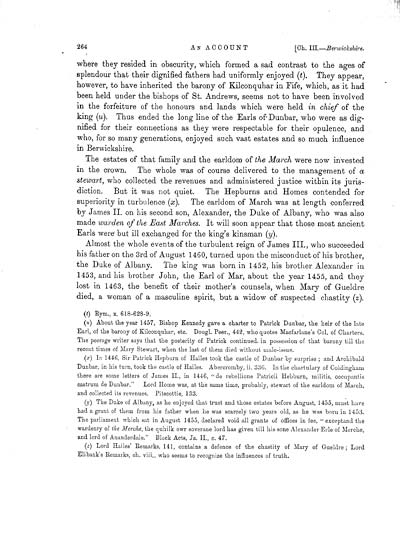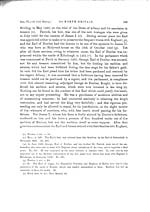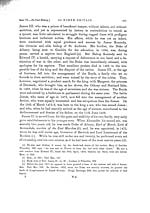Volume 3
(276) Page 264
Download files
Individual page:
Thumbnail gallery: Grid view | List view

264 where they resided in obscurity, which formed a sad contrast to the ages of splendour that their dignified fathers had uniformly enjoyed (t). They appear, however, to have inherited the barony of Kilconquhar in Fife, which, as it had been held under the bishops of St. Andrews, seems not to have been involved in the forfeiture of the honours and lands which were held in chief of the king (u). Thus ended the long line of the Earls of Dunbar, who were as dig- nified for their connections as they were respectable for their opulence, and who, for so many generations, enjoyed such vast estates and so much influence in Berwickshire. The estates of that family and the earldom of the March were now invested in the crown. The whole was of course delivered to the management of a Stewart, who collected the revenues and administered justice within its juris- diction. But it was not quiet. The Hepburns and Homes contended for superiority in turbulence (x). The earldom of March was at length conferred by James II. on his second son, Alexander, the Duke of Albany, who was also made warden of the East Marches, It will soon appear that those most ancient Earls were but ill exchanged for the king's kinsman (y). Almost the whole events of the turbulent reign of James III., who succeeded his father on the 3rd of August 1460, turned upon the misconduct of his brother, the Duke of Albany. The king was born in 1452, his brother Alexander in 1453, and his brother John, the Earl of Mar, about the year 1455, and they lost in 1463, the benefit of their mother's counsels, when Mary of Gueldre died, a woman of a masculine spirit, but a widow of suspected chastity (z). (t) Rym., x. 618-628-9. (u) About the year 1457, Bishop Kennedy gave a charter to Patrick Dunbar, the heir of the late Earl, of the barony of Kilconquhar, etc. Dougl. Peer., 442, who quotes Macfarlane's Col. of Charters. The peerage writer says that the posterity of Patrick continued, in possession of that barony till the recent times of Mary Stewart, when the last of them died without mule-issue. (x) In 1446, Sir Patrick Hepburn of Hailes took the castle of Dunbar by surprise ; and Archibald Dunbar, in his turn, took the castle of Hailes. Abercromby, ii. 386. In the chartulary of Coldingham there are some letters of James II., in 1446, "de rebellione Patricii Hebburn, militis, occupantis castruna de Dunbar." Lord Home was, at the same time, probably, stewart of the earldom of March, and collected its revenues. Pitscottie, 133. (y) The Duke of Albany, as he enjoyed that trust and those estates before August, 1455, must have had a grant of them from his father when he was scarcely two years old, as he was born in 1453. The parliament which sat in August 1455, declared void all grants of offices in fee, " exceptand the wardenry of the Merche, the quhilk owr soverane lord has given till his sone Alexander Erle of Merche, and lord of Ananderdale." Black Acts, Ja. II., c. 47. (z) Lord Hailes' Remarks, 141, contains a defence of the chastity of Mary of Gueldre; Lord Elibank's Remarks, ch. viii., who seems to recognize the influences of truth.
Set display mode to:
![]() Universal Viewer |
Universal Viewer | ![]() Mirador |
Large image | Transcription
Mirador |
Large image | Transcription
Images and transcriptions on this page, including medium image downloads, may be used under the Creative Commons Attribution 4.0 International Licence unless otherwise stated. ![]()
| Caledonia, or, An account, historical and topographic of North Britain from the most ancient to the present times > Volume 3 > (276) Page 264 |
|---|
| Permanent URL | https://digital.nls.uk/74528626 |
|---|---|
| Description | Vol. III. |
|---|---|
| Attribution and copyright: |
|

